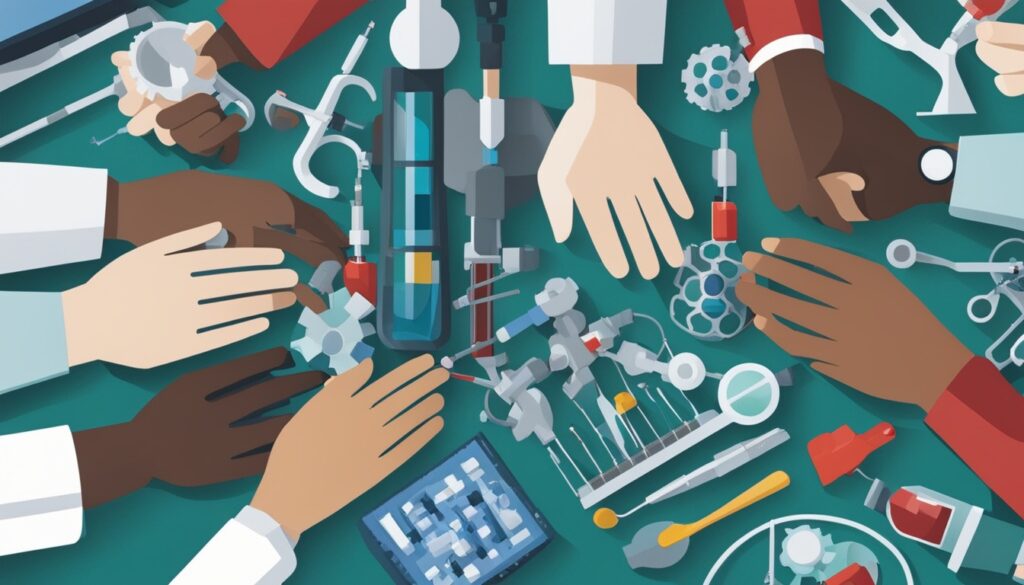The field of medical research holds the key to transforming the healthcare landscape and empowering individuals to achieve better health outcomes. Through a relentless pursuit of advancements in diagnostics, therapeutics, and the management of rare and complex medical conditions, medical research has the power to revolutionize the way we approach personalized healthcare. The adoption of cutting-edge technologies, such as artificial intelligence and big data analytics, further enhances the potential of medical research to drive positive change and deliver more effective and personalized care to healthcare providers and patients alike.
At the forefront of this transformative journey, medical research plays a pivotal role in shaping the future of healthcare. By fostering collaboration, leveraging medical knowledge, and embracing technological advancements, the medical research community is paving the way for a healthcare landscape that is more equitable, inclusive, and responsive to the unique needs of individuals. From accelerating the development of life-saving diagnostics and therapeutics to navigating the complexities of rare genetic disorders, medical research holds immense promise in empowering healthcare providers and patients to achieve the highest standards of care.
Key Takeaways
- Medical research plays a pivotal role in shaping the future of healthcare by driving advancements in diagnostics, therapeutics, and the management of rare and complex medical conditions.
- The adoption of cutting-edge technologies, such as artificial intelligence and big data analytics, enhances the potential of medical research to transform the healthcare landscape and deliver more personalized care.
- Collaboration, the leveraging of medical knowledge, and the embrace of technological advancements are key to the transformative power of medical research.
- Medical research holds the promise of accelerating the development of life-saving diagnostics and therapeutics, as well as navigating the complexities of rare genetic disorders.
- The medical research community is committed to empowering healthcare providers and patients to achieve the highest standards of care and improve health outcomes.
Exploring the Pivotal Role of Medical Research
Medical research stands as a cornerstone in the advancement of healthcare, playing a pivotal role in shaping the future of medicine. This multifaceted field of study encompasses a diverse range of disciplines, each contributing to the enhancement of diagnostics, therapeutics, and the management of rare and complex medical conditions. Healthcare providers, armed with the insights and innovations derived from medical research, are empowered to deliver more personalized and effective care to their patients.
Fostering Advancements in Diagnostics
Accurate and timely diagnosis is the foundation of effective medical treatment. Medical research has been instrumental in the development of cutting-edge diagnostic tools and techniques, enabling healthcare providers to identify a wide range of medical conditions with greater precision. From advanced imaging technologies to sophisticated biomarker analysis, these advancements in diagnostics have revolutionized the way healthcare professionals approach disease management, leading to earlier interventions and improved patient outcomes.
Driving Innovation in Therapeutics
Alongside the progress in diagnostics, medical research has also been a driving force behind the development of novel therapeutics and therapeutic approaches. Researchers continue to explore new frontiers in pharmacology, uncovering innovative remedies and therapeutic approaches that address a diverse range of medical conditions, including rare and complex disorders. Through rigorous clinical trials and the evaluation of emerging treatments, medical research empowers healthcare providers to deliver more personalized and effective care to their patients.
Navigating Rare and Complex Medical Conditions
The field of medical research has also made significant strides in understanding and managing rare and complex medical conditions. By leveraging advanced technologies, conducting in-depth studies, and fostering collaborative efforts, researchers are able to gain deeper insights into the underlying causes, pathways, and potential treatments for these challenging healthcare challenges. This knowledge, in turn, enables healthcare providers to navigate the complexities of rare diseases and offer more tailored care, ultimately improving the lives of individuals affected by these conditions.
Also Read : Breaking Barriers In Medical Research: A Journey Of Discovery And Hope
| Key Focus Areas of Medical Research | Advancements and Impacts |
|---|---|
| Diagnostics |
|
| Therapeutics |
|
| Rare and Complex Medical Conditions |
|
https://www.youtube.com/watch?v=4pLsHhP7yTw
Embracing Technological Advancements in Medicine
The healthcare industry has embraced the transformative power of technological advancements, particularly in the realm of artificial intelligence (AI) and big data analytics, to enhance the delivery of medical care and improve patient outcomes. These innovative technologies are paving the way for more personalized, efficient, and effective healthcare solutions, revolutionizing the medical landscape.
Also Read : Smart Money Moves: Strategies For Student Loan Repayment Success
Artificial Intelligence in Healthcare
The integration of artificial intelligence (AI) into the healthcare sector has unveiled a wealth of opportunities to streamline diagnostic processes, optimize treatment plans, and enhance patient care. AI-powered algorithms are capable of analyzing vast amounts of medical data, including patient records, imaging scans, and laboratory results, to identify patterns and provide more accurate and timely diagnoses. This technology has proven invaluable in the early detection of diseases, enabling healthcare providers to intervene promptly and improve patient outcomes.
Moreover, AI-driven clinical decision support systems are transforming the way healthcare professionals make treatment decisions. By leveraging machine learning algorithms, these systems can recommend personalized treatment plans, taking into account a patient’s unique medical history, genetic profile, and response to previous interventions. This level of personalization has the potential to significantly enhance the quality of care and patient satisfaction.
Also Read : Unveiling Tomorrow’s Cures: Medical Research in the Digital Age
Big Data Analytics for Personalized Care
The healthcare industry’s embrace of big data analytics has paved the way for more personalized and targeted care. By analyzing vast troves of patient data, healthcare providers can gain valuable insights into individual health patterns, risk factors, and optimal treatment approaches. This data-driven approach enables the development of tailored diagnostic tools, therapeutics, and care plans that address the unique needs of each patient.
The integration of big data analytics with electronic health records (EHRs) and wearable devices has further enhanced the potential for personalized care. Healthcare providers can now monitor patient data in real-time, identify early warning signs, and proactively intervene to prevent or manage health conditions. This data-driven approach empowers patients to take an active role in their healthcare, fostering improved engagement and better health outcomes.

| Technological Advancements | Impact on Healthcare |
|---|---|
| Artificial Intelligence (AI) | Enhances diagnostic accuracy, optimizes treatment plans, and supports clinical decision-making. |
| Big Data Analytics | Enables personalized care, improves patient monitoring, and drives data-driven interventions. |
| Wearable Devices | Facilitates real-time patient monitoring, early disease detection, and remote healthcare delivery. |
| Electronic Health Records (EHRs) | Streamlines data management, enhances care coordination, and supports evidence-based decision-making. |
Collaborative Partnerships: Propelling Medical Progress
The advancement of medicine and healthcare relies heavily on the collaborative efforts of researchers, healthcare professionals, and industry stakeholders. These strategic partnerships serve as the bedrock for translating groundbreaking medical research into real-world clinical practice, ultimately driving medical progress and addressing the pressing healthcare challenges facing the global community.
Also Read : Funding Your Future: Comprehensive Student Loan Options
Bridging the Gap Between Research and Clinical Practice
Collaborative partnerships play a pivotal role in bridging the gap between medical research and clinical practice. By fostering seamless integration between academia, healthcare providers, and the pharmaceutical industry, these alliances facilitate the timely and effective translation of innovative diagnostics, therapeutics, and treatment approaches from the research lab to the patient’s bedside. This collaborative ecosystem enables healthcare professionals to stay at the forefront of medical advancements, empowering them to deliver the highest quality of personalized care to their patients.
Fostering Global Collaborations in Medical Research
The pursuit of medical progress knows no borders, and global collaborations in medical research have become increasingly essential. Researchers and healthcare professionals from around the world are joining forces to tackle the most pressing healthcare challenges, leveraging their diverse expertise, resources, and perspectives. These global collaborations foster the exchange of knowledge, the sharing of best practices, and the development of strategic partnerships that drive innovation in medicine, clinical trials, and healthcare policies. By harnessing the power of international collaboration, the medical community can accelerate the pace of medical progress and ensure that the benefits of advancements in healthcare are accessible to populations across the globe.
Also Read : Secrets To National Merit Scholarships: Key Requirements Unveiled
| Collaborative Partnerships | Benefits |
|---|---|
| Bridging Research and Clinical Practice | Timely translation of innovations, improved patient outcomes, and enhanced quality of care |
| Global Collaborations in Medical Research | Accelerated medical progress, knowledge-sharing, and equitable access to healthcare advancements |
| Strategic Partnerships between Industry and Healthcare | Fostering innovation, streamlining drug development and approval processes, and optimizing patient care |
The power of collaborative partnerships in the medical field cannot be overstated. By fostering synergies between researchers, healthcare professionals, and industry stakeholders, the medical community can propel medical progress, address global healthcare challenges, and deliver the most effective and personalized care to patients worldwide.

Patient-Centric Approaches in Medical Research
The medical research landscape has undergone a profound transformation, with a growing emphasis on patient-centric approaches that place the needs and perspectives of individuals at the forefront of scientific endeavors. This shift has been driven by a recognition that meaningful personalized care and improved patient outcomes can only be achieved by actively engaging with patient data and patient empowerment.
Healthcare providers and the healthcare industry have increasingly embraced the importance of incorporating patient-centric principles into their research and development processes. This has led to the creation of new healthcare policies and initiatives that prioritize the quality of care and address the unique healthcare challenges faced by diverse patient populations within the healthcare landscape.
By placing the patient at the center of medical research, researchers and clinicians can better understand the patient perspectives and tailor therapeutic approaches and clinical trials to meet the specific needs of individuals. This approach not only enhances the personalized care delivered but also fosters a greater sense of patient empowerment and engagement, ultimately leading to improved patient outcomes.

Medicine: Transforming Healthcare Landscapes
The field of medicine holds immense promise in transforming the healthcare landscape, addressing global health challenges, and promoting equitable access to quality healthcare services. As the medical community continues to make advancements in diagnostics, therapeutics, and personalized care, the impact of medicine on public health and the overall well-being of individuals worldwide is becoming increasingly profound.
Addressing Global Health Challenges
From tackling the ongoing pandemic to developing novel therapies for rare genetic disorders, the medical research community has a critical role to play in addressing the complex and ever-evolving global health challenges. By leveraging the latest innovations in pharmaceuticals, drugs, clinical trials, and diagnostic tools, healthcare providers and the healthcare industry are better equipped to navigate the complexities of the medical landscape and deliver more effective and personalized care to patients.
Promoting Equitable Access to Healthcare
Ensuring equitable access to healthcare services is a fundamental goal of the medical community. Through collaborative partnerships, strategic investments, and the implementation of healthcare policies that prioritize the needs of underserved populations, the field of medicine is working to bridge the gap and provide quality healthcare services to individuals across the global healthcare landscape. This commitment to promoting equitable access to personalized care is crucial in addressing healthcare challenges and improving the overall well-being of communities worldwide.

Empowering Healthcare Professionals through Research
Medical research plays a crucial role in empowering healthcare professionals, equipping them with the knowledge and tools necessary to deliver the highest standards of care and continuously improve health outcomes for their patients. By fostering continuous medical education and facilitating the dissemination of medical knowledge, research in the healthcare field empowers providers to stay at the forefront of their respective medical specialties.
Continuous Medical Education and Training
Ongoing medical education and training are essential for healthcare professionals to stay abreast of the latest advancements in diagnostics, therapeutics, and the management of complex medical conditions. Through collaborative partnerships between researchers, academic institutions, and healthcare providers, the medical community can ensure that healthcare professionals have access to the most up-to-date information and the opportunity to enhance their skills and expertise.
Disseminating Medical Knowledge
The dissemination of medical knowledge is a critical component in empowering healthcare providers to deliver exceptional care. Medical research findings, clinical trials, and innovative treatment approaches must be effectively communicated to the broader medical community, enabling healthcare professionals to stay informed and incorporate the latest advancements into their clinical practice. By fostering knowledge sharing and collaboration, the medical research community can support healthcare providers in their relentless pursuit of medical excellence and quality assurance.
| Key Aspects of Empowering Healthcare Professionals through Medical Research | Importance |
|---|---|
| Continuous Medical Education and Training | Ensures healthcare professionals stay up-to-date with the latest advancements in diagnostics, therapeutics, and medical management, enhancing their ability to provide high-quality, evidence-based care. |
| Dissemination of Medical Knowledge | Facilitates the effective communication of research findings, clinical trials, and innovative treatment approaches to the broader medical community, enabling healthcare providers to incorporate the latest advancements into their clinical practice. |
| Collaboration between Researchers and Healthcare Providers | Fosters the exchange of knowledge and expertise, enabling healthcare professionals to actively participate in the research process and inform the development of more effective and personalized medical interventions. |
| Emphasis on Quality Assurance and Medical Excellence | Ensures healthcare providers adhere to the highest standards of care, continuously improving patient outcomes and contributing to the advancement of the medical field as a whole. |
Shaping the Future of Personalized Healthcare
The future of healthcare is poised to be increasingly personalized, leveraging the advancements in precision medicine and tailored treatments to deliver more effective and targeted care for individuals. As the healthcare industry embraces the power of personalized healthcare, the landscape is transforming to prioritize the unique genetic and biological profiles of patients, empowering healthcare providers to offer tailored interventions that optimize patient outcomes.
Also Read : Breaking Stereotypes – The Many Specialties And Services Offered In Hospitals Today
Precision Medicine and Tailored Treatments
The rise of precision medicine has revolutionized the way healthcare providers approach diagnostics and therapeutics. By harnessing the power of cutting-edge technologies, including genomic sequencing and advanced data analytics, healthcare professionals can now develop highly personalized treatment plans that take into account an individual’s unique genetic makeup, disease susceptibilities, and response to various medical interventions. This shift towards precision medicine has paved the way for more effective and personalized care, leading to improved patient outcomes and a more targeted approach to managing complex medical conditions.
Patient Empowerment and Engagement
Alongside the advancements in precision medicine, the healthcare landscape is also witnessing a growing emphasis on patient empowerment and engagement. Patients are increasingly becoming active participants in their own care, collaborating with healthcare providers to make informed decisions and shape their personalized treatment plans. By providing patients with access to their own health data and empowering them to play a more active role in managing their conditions, the healthcare industry is fostering a new era of patient-centric care that promotes better health outcomes and enhanced patient satisfaction.

Navigating Ethical and Regulatory Considerations
As the field of medicine continues to advance, it is essential to navigate the ethical and regulatory considerations that accompany the pursuit of medical progress. Upholding the highest standards of quality assurance and adhering to rigorous ethical guidelines are paramount in ensuring the responsible development and implementation of innovative medical interventions.
Quality Assurance in Medical Research
In the dynamic landscape of healthcare, healthcare providers and the healthcare industry must prioritize quality assurance to safeguard patient safety and ensure the integrity of medical research. This includes meticulous adherence to established healthcare policies, systematic data management, and the implementation of robust quality control measures throughout the research and development process.
Ethical Guidelines and Responsible Innovation
The pursuit of medical progress must be grounded in a steadfast commitment to ethical considerations and responsible innovation. Healthcare providers and healthcare policy experts must work in tandem to develop and uphold rigorous ethical guidelines that protect patient privacy, informed consent, and the fair and equitable access to medical treatments, diagnostics, and therapeutics. This collaborative approach ensures that patient safety and patient data remain the top priorities as the healthcare industry navigates the complexities of medical research and drug development.

Conclusion: Empowering Health through Relentless Pursuit
In the ever-evolving landscape of healthcare, medical research stands as a beacon of hope, empowering individuals and communities to achieve better health outcomes. Through a relentless pursuit of advancements in diagnostics, therapeutics, and the management of complex medical conditions, the medical research community has the power to transform the healthcare landscape and improve the lives of individuals worldwide.
The integration of cutting-edge technologies, such as artificial intelligence and big data analytics, has further enhanced the potential of medical research to deliver personalized care and drive innovation. Collaborative partnerships between researchers, healthcare providers, and industry stakeholders have been instrumental in bridging the gap between research and clinical practice, ensuring that medical progress translates into tangible benefits for patients.
As the medical research community continues to push the boundaries of what is possible, it is essential to navigate the ethical and regulatory considerations that accompany this pursuit. Upholding the highest standards of quality assurance and adhering to rigorous ethical guidelines are paramount in ensuring the responsible development and implementation of innovative medical interventions.
In conclusion, the relentless pursuit of medical research holds the key to empowering health and shaping the future of medicine. By addressing global healthcare challenges, promoting equitable access to healthcare services, and empowering healthcare professionals, the medical research community is poised to transform the healthcare landscape and improve the overall well-being of individuals and communities around the world.
FAQs
What is the pivotal role of medical research in shaping the future of healthcare?
Medical research plays a crucial role in fostering advancements in diagnostics, driving innovation in therapeutics, and navigating the complexities of rare and complex medical conditions. By empowering healthcare providers to deliver more effective and personalized care, medical research is transforming the healthcare landscape.
How are technological advancements, such as artificial intelligence and big data analytics, being leveraged in the medical field?
The healthcare industry has embraced the transformative power of technological advancements, particularly in the realm of artificial intelligence (AI) and big data analytics. These technologies are enhancing the delivery of medical care and improving patient outcomes by enabling personalized care and data-driven insights.
What is the importance of collaborative partnerships in propelling medical progress?
Collaborative partnerships between researchers, healthcare professionals, and industry stakeholders play a pivotal role in bridging the gap between research and clinical practice, fostering global collaborations, and addressing the pressing healthcare challenges facing the global community.
How are patient-centric approaches shaping the future of medical research?
The medical research landscape has undergone a paradigm shift, with a growing emphasis on patient-centric approaches that place the needs and perspectives of individuals at the forefront of scientific endeavors. This focus on personalized care and patient empowerment is transforming the way medical research is conducted and how healthcare is delivered.
What is the transformative potential of medicine in addressing global health challenges and promoting equitable access to healthcare?
The field of medicine holds immense promise in transforming the healthcare landscape, addressing global health challenges, and promoting equitable access to quality healthcare services. By developing innovative diagnostic tools, novel therapies, and collaborative partnerships, the medical community is paving the way for a more inclusive and effective healthcare system.
How does medical research empower healthcare professionals to deliver the highest standards of care?
Medical research plays a crucial role in empowering healthcare professionals, enabling them to continuously expand their medical knowledge, enhance their clinical skills, and deliver the highest standards of care. Through ongoing education, training, and the dissemination of cutting-edge research, healthcare professionals can improve health outcomes and provide more effective and personalized care.
What is the future of personalized healthcare, and how is it shaping the medical landscape?
The future of healthcare is poised to be increasingly personalized, leveraging the advancements in precision medicine and tailored treatments to deliver more effective and targeted care for individuals. By empowering patients and engaging them in their own healthcare journeys, medical research is transforming the way medicine is practiced and improving overall patient outcomes.
What ethical and regulatory considerations are important in the field of medical research?
As the field of medicine continues to advance, it is essential to navigate the ethical and regulatory considerations that accompany the pursuit of medical progress. Upholding the highest standards of quality assurance and adhering to rigorous ethical guidelines are paramount in ensuring the responsible development and implementation of innovative medical interventions, prioritizing patient safety and data privacy.

